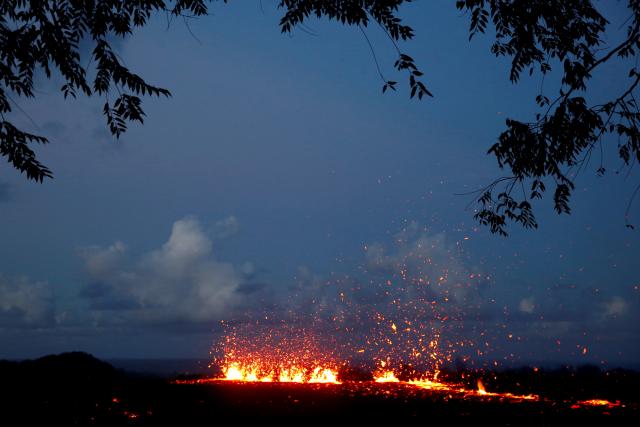A plume of gray ash and smoke rose several thousand feet above Kilauea’s summit and drifted southwest to the Ka’u district and further downwind, the Hawaiian Volcano Observatory said.
“Excessive exposure can cause eye/breathing irritation. Motorists advised to drive with caution,” said the County of Hawaii Civil Defense text message.
The ash threatened Ka’u district, which is about 30 miles southwest of Kilauea. To the east of the summit, toxic gas emanating from steaming gashes around 25 miles (40 km) toward the coast added to the danger facing residents, whose escape routes are threatened with closure because of lava flows, officials said.
Dangerous levels of sulfur dioxide gas and other emissions prompted state health officials to urge residents to stay indoors or leave the eastern end of Hawaii’s Big Island, which has been ravaged by volcanic activity since May 3.
A 20th fissure releasing lava and gases has opened on Kilauea’s side, state officials said Tuesday.
Lava oozing out of fissures have hit the island’s lower Puna area especially hard, tearing through farmland some 25 miles (40 km) east of the volcano’s smoking summit, destroying 37 homes and other structures and posing a risk of blocking one of the last exit routes, state Highway 132.
There have been no major injuries or death reported from the eruption. Officials have ordered around 2,000 residents to evacuate the Leilani Estates area in the eastern Puna district where fissures first appeared. No evacuations have been ordered from Ka’u district.
Lava from one of the fissures has been moving toward a coastal dirt road that is also a key access route for some 2,000 residents in the southeastern area of the Big Island, home to around 200,000 people.
Mass evacuations would be triggered if either highway is hit by lava, Hawaii National Guard spokesman Major Jeff Hickman said.
President Donald Trump on Friday approved a disaster declaration that makes federal relief available to the state.
The Federal Emergency Management Agency, which has a team in place on the Big Island, said it would assist the state with at least 75 percent of emergency measures and replacing damaged infrastructure.
The U.S. Geological Survey has warned that pent-up steam could cause a violent explosion at the volcano crater, launching a 20,000-foot (6,100-meter) plume that could spread debris over 12 miles (19 km).
Scientists had expected such explosions by the middle of this month as Kilauea’s lava lake fell below the water table. But water may not be entering the crater, as feared, and gas and steam may be safely venting, scientists said.
More about: #Hawaii
















































